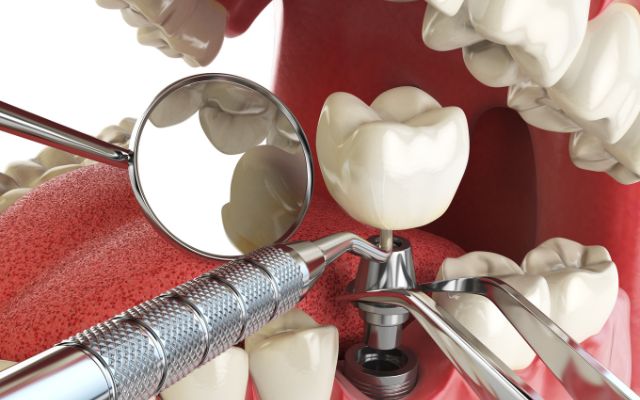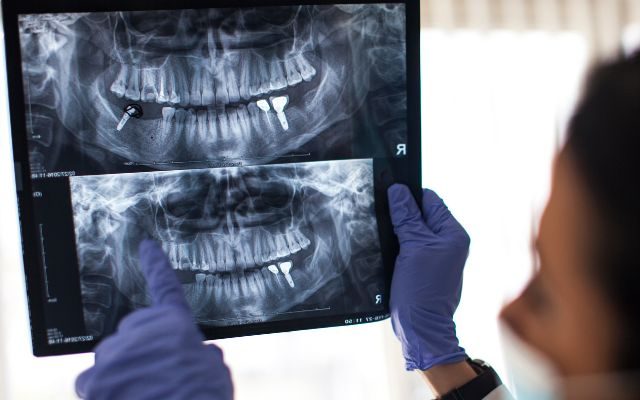Dental Implants in Bassendean
A dental implant is an artificial tooth root that is put in your jaw to support a prosthetic tooth or bridge. On the other hand, when most people use the word “dental implants,” they’re referring to the mated implant and prosthetic tooth. So what you need to know about dental implant treatment? Read more below!
At Spring Orchid Dental in Bassendean, we provide advanced dental implant solutions with gentle care and clear guidance every step of the way.

What is A Dental Implant?
Implants are a permanent solution that will mimic your natural teeth and provide a fully functional replacement for lost teeth.
Looking and feeling natural; teeth dental implants can give you something to smile about.
How Do You Know If You Need The Implant?
- Missing single tooth
- Missing multiple teeth
- Loose and uncomfortable dentures
- Difficulty in chewing or speaking
Benefits of Dental Implants
- Dental implants are an excellent technique to restore missing teeth and provide a permanent alternative to removable partial or full dentures.
- Restore or enhance facial tissues.
- Helps to secure and comfort a bridge or denture.
- Restore a patient’s confident smile.

Not Affecting Adjacent Teeth
Replace one or more lost teeth while keeping neighboring teeth unchanged. Because neighboring teeth are not used to support an implant, dental implants do not cause tooth loss. Healthy teeth are unaffected!
Implants Are For Single Or Multiple Missing Teeth
Dental Implants are an excellent solution to replace single, or multiple missing teeth or stabilization of dentures for aesthetics and function.
Can Resolve Joint Pain & Bite Problems
Resolve joint discomfort or bite issues caused by teeth sliding into missing tooth space.
Dental implants will restore chewing, speech, and digestion, allowing you to speak and eat with confidence and ease once more. In contrast to removable dentures, they are stable and won’t wobble or click.
Look And Function
Dental implants replace missing teeth and are designed to look like and function in a similar way to natural teeth without compromising any of the remaining teeth. Implants replace both the ‘root’ and the ‘crown’ of the tooth in positions similar to those teeth that have been lost. The jaw bone bonds with the implant, anchoring it to the bone.
The teeth attached to implants are very natural looking and often enhance or restore a patient’s smile!
Strong And Durable
Dental implants are extremely robust, stable, and long-lasting, but they will need to be re-tightened or replaced.
High Success Rate
Dental implants have a high success rate. They are regarded as an effective tooth replacement alternative.
It Will Change Your Life
Dental Implants have changed the world of dentistry. Let it change your life too. If you are suffering from loose, painful dentures, you have difficulty chewing due to uncomfortable dentures, or missing teeth; the Spring Orchid Dental team has the right answer for you.
How Dental Implant Works?
A dentist or periodontist, who specializes in the gums and supporting bone, will surgically put dental implants—artificial roots and teeth that are often made of titanium—into either the upper or lower jaw bone.
The implant serves as support for dental prostheses such crowns, bridges, dentures, face prostheses, or anchors for braces.
These dental items benefit greatly from the support and stability provided by implants.
Who Is A Good Candidate For Implants?
Spring Orchid Dental evaluates patients for dental implant surgery based on the following criteria.
Age
Dental implants work best in people who have finished growing and maturing.
If you or your child is too young, you may have to wait until your facial structure has formed before proceeding. This is commonly around the ages of 16 for girls and 18 for boys.
Bone
When a tooth is extracted, the bone around it begins to degenerate. A specific quantity of bone must be present for the post to fuse with it. There might not be enough bone for dental implant surgery if you’ve had a tooth missing for a time.
We utilize a CBCT scanner to determine this. If you have adequate bone, we will proceed with your customized treatment strategy.
We can frequently do a bone grafting treatment if you lack sufficient bone for dental implants. This therapy can aid in the regeneration of bone and tissue in your body.
Health
Dental implant surgery, like most other procedures, necessitates good general and oral health. Dental implants might not be a good option if you have gum disease, diabetes, or if you smoke a lot.
Rest confident that our dentists will assess you individually and, if necessary, will collaborate with your physician to find a solution.
Types of Implants
Endosteal and subperiosteal dental implants are the two most common types of dental implants. Endosteal is the most common and safest technique, followed by subperiosteal. Here are the distinctions between them.
Endosteal Implants
Endosteal implants are the most frequent type of dental implant, often composed of titanium. They are suitable for the majority of patients, but they require a good, healthy jawbone to fuse to.
They are screw-shaped placeholder posts. They insert the jaw into which the false teeth are inserted.
It takes some time for the wound to heal after the treatment. It takes time for the pieces to come together and become a stronghold. Once healed, the false teeth can be fitted to the post to match the neighboring teeth.
If you don’t like the notion of anything being implanted in your jawbone, you could choose the second most frequent implant.
Subperiosteal Implant
Subperiosteal implants, as opposed to being embedded in the jawbone, lay on top of the bone, behind the gum.
A metal frame with a post is inserted beneath the gum. Following that, the gum heals around the frame, holding it in place. The fake teeth are attached to the gum poles.
This method is only utilized if the patient lacks adequate jawbone to support an implant or if the patient just does not want to undergo extensive oral surgery to create bone to the area.
Dental Implant Process
Dental implant procedure:

Time And Visits
The procedure for receiving implants entails multiple appointments spread out over several months. In more severe instances, implementing a comprehensive treatment plan might take up to 12 months.
Implant Placement Surgery
X-rays and impressions (molds) are taken of the jaw and teeth to determine bone, gum tissue, and spacing available for an implant. While the area is numb, the implant will be surgically placed into the bone and allowed to heal and integrate itself into the bone for up to six months.
Post-Placement Surgery
A second procedure, depending on the kind of implant, may be necessary to install the “post” that will keep the prosthetic tooth in place. Other implants have the post and anchor already connected and implanted at the same moment.
Fitting Artificial Teeth
After many weeks of recovery, the artificial teeth are created and affixed to the anchor’s post section. This stage might take one to two months to complete because many fits may be necessary. After a time of healing, the prosthetic teeth are firmly linked to the implant, providing the patient with outstanding stability and comfort.
Pain Free Dental Implants
At Spring Orchid Dental, we offer you pain-free dental implants, which have the latest technology, best quality, and affordable prices.
Dental Implant Success Rate
The success or failure of implants is determined by the health of the individual receiving them, pharmaceuticals that affect the chances of osseointegration, and the health of the tissues in the mouth.
Additionally assessed is the amount of strain that will be placed on the fixture and implant during typical function. However, implants have a good success rate in general and can be used to replace a single tooth, a few teeth, or as a replacement for a full set of dentures.
Implant Retained Denture
A fixed form of denture, such as an implant retained one, is one that is more stable. You will no longer remember having a missing tooth thank to dental implant restorations. They feel and look so natural.
Dental Implants at Spring Orchid Dental
Spring Orchid Dental is ready to alleviate any anxiety or worry caused by dental issues. We’re in the business of taking great care of people first, then of your dental health. We support providing care that puts the patient at the center and puts them in control. We are delighted to be your Bassendean dentist.
No matter what type of dental treatment you want, joining Spring Orchid Dental is simple. This is how it works:
- Step 1: Get in touch with our helpful staff.
There are several methods to get in touch with us. You may reach us at 08 6155 8999 or book an appointment online. - Step 2: Schedule your first appointment with the dentist.
We will arrange at your convenience, and based on your goals and the dentist’s assessment, you will reach an appropriate decision regarding the next steps. - Step 3: Create a personalized treatment plan.
We then create a personalized treatment plan to match your oral and financial objectives, ensuring you receive the care you require while also having a variety of financing alternatives available to help if required.
FAQs
How Long Does A Dental Implant Procedure Take?
Usually, the implant procedure can last from 1 to 2 hours. Healing duration ranges from 3 to 6 months. The titanium alloy implant will heal around and fuse with the surrounding bone tissue during this time.
Do They Put You To Sleep For Dental Implants?
Any dental implant operation will require some kind of sedation or anesthetic to be performed. However, how much sedation you receive is totally up to you and how comfortable you want. It is still within the safe range and the dentist’s approval.
How Many Dental Implants Can You Have At Once?
The amount will vary depending on how many teeth you need to have dental implants replace. The oral health of each individual will vary, though. For the correct response, you must visit your dentist.
Does Insurance Cover The Cost Of Dental Implants?
Currently, dental insurance does not typically provide coverage for dental implants. Depending on your insurance plan and/or the cause of tooth loss, coverage under your medical plan may be available. Asking your dentist and insurance company specific questions about your unique requirements and how they relate to coverage is recommended.
How Long Do Implants Last?
Between 10 and 20 years is the typical lifespan of saline or silicone implants. Due to problems or aesthetic issues, many are removed earlier. Within 8 to 10 years, up to 20% of people will have their implants removed or replaced.





